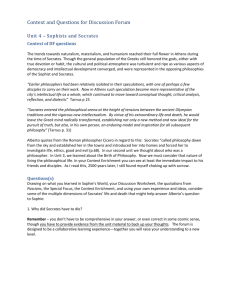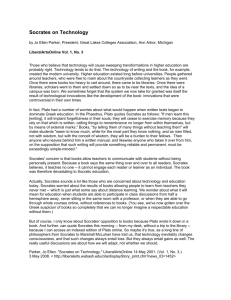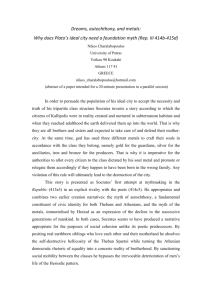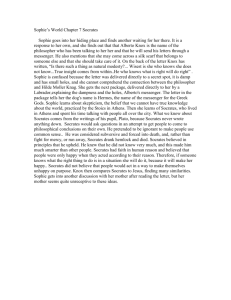File - Start your own free website
advertisement
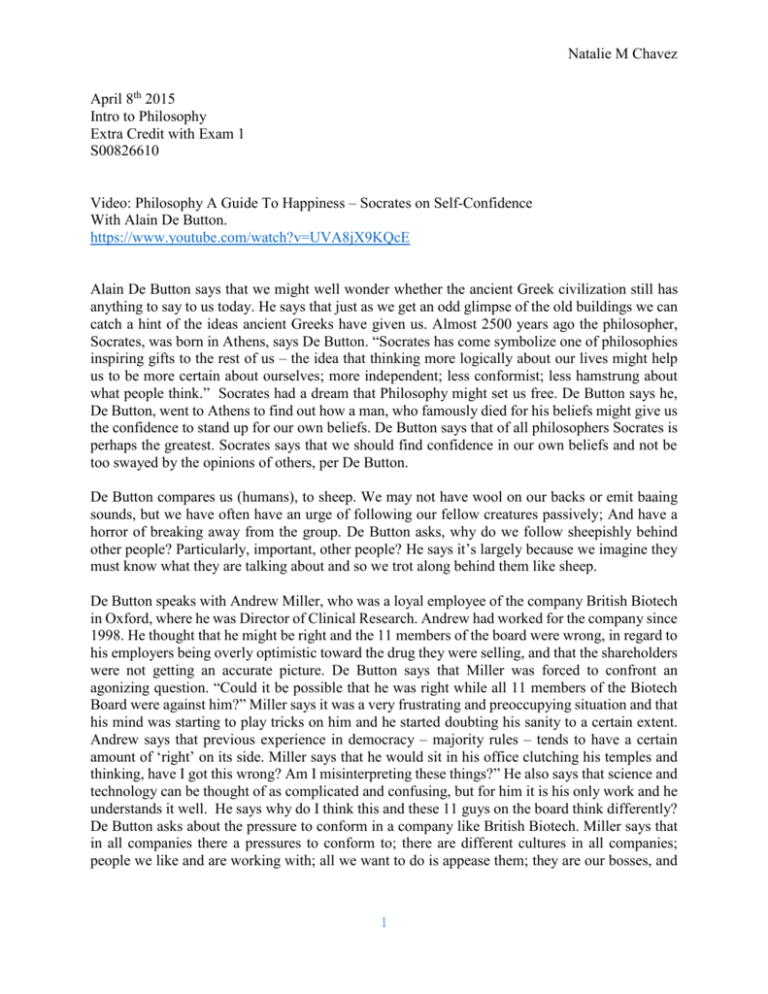
Natalie M Chavez April 8th 2015 Intro to Philosophy Extra Credit with Exam 1 S00826610 Video: Philosophy A Guide To Happiness – Socrates on Self-Confidence With Alain De Button. https://www.youtube.com/watch?v=UVA8jX9KQcE Alain De Button says that we might well wonder whether the ancient Greek civilization still has anything to say to us today. He says that just as we get an odd glimpse of the old buildings we can catch a hint of the ideas ancient Greeks have given us. Almost 2500 years ago the philosopher, Socrates, was born in Athens, says De Button. “Socrates has come symbolize one of philosophies inspiring gifts to the rest of us – the idea that thinking more logically about our lives might help us to be more certain about ourselves; more independent; less conformist; less hamstrung about what people think.” Socrates had a dream that Philosophy might set us free. De Button says he, De Button, went to Athens to find out how a man, who famously died for his beliefs might give us the confidence to stand up for our own beliefs. De Button says that of all philosophers Socrates is perhaps the greatest. Socrates says that we should find confidence in our own beliefs and not be too swayed by the opinions of others, per De Button. De Button compares us (humans), to sheep. We may not have wool on our backs or emit baaing sounds, but we have often have an urge of following our fellow creatures passively; And have a horror of breaking away from the group. De Button asks, why do we follow sheepishly behind other people? Particularly, important, other people? He says it’s largely because we imagine they must know what they are talking about and so we trot along behind them like sheep. De Button speaks with Andrew Miller, who was a loyal employee of the company British Biotech in Oxford, where he was Director of Clinical Research. Andrew had worked for the company since 1998. He thought that he might be right and the 11 members of the board were wrong, in regard to his employers being overly optimistic toward the drug they were selling, and that the shareholders were not getting an accurate picture. De Button says that Miller was forced to confront an agonizing question. “Could it be possible that he was right while all 11 members of the Biotech Board were against him?” Miller says it was a very frustrating and preoccupying situation and that his mind was starting to play tricks on him and he started doubting his sanity to a certain extent. Andrew says that previous experience in democracy – majority rules – tends to have a certain amount of ‘right’ on its side. Miller says that he would sit in his office clutching his temples and thinking, have I got this wrong? Am I misinterpreting these things?” He also says that science and technology can be thought of as complicated and confusing, but for him it is his only work and he understands it well. He says why do I think this and these 11 guys on the board think differently? De Button asks about the pressure to conform in a company like British Biotech. Miller says that in all companies there a pressures to conform to; there are different cultures in all companies; people we like and are working with; all we want to do is appease them; they are our bosses, and 1 Natalie M Chavez we are wanting to help them, we are wanting to work with them. We want to be friends with them says Miller. De Button says that the first reason it is hard to feel confident in Millers situation is that we tend to accept that people in authority must be right. “The European community has said this beef is utterly safe”. This is the assumption that Socrates wanted us to challenge. By urging us to think logically about the nonsense they offer and come up with, rather than being struck dumb, by their aura of importance and air of suave certainty. The narrator points out that in deciding when to follow prominent people, and when to disagree with them Socrates had one huge advantage over us, because he could always talk to them in person. Athens in his day had a population of just 150,000 and all the citizens when to Agra (the market) and main meeting place of Athens. If we would have visited in 5th Century B.C., we would have been likely to see amongst the bustle of the city, a rather curious, ugly figure; for most of his adult life, Socrates got up at dawn and came to spend the day amongst the shopkeepers and merchants who had their stores there. It was not only local people that went to the market, says De Button; it was also the most important people in Athenian society; so that they could meet at any point in the day. There were great military generals, opinion formers, great statesmen important rhetoricians, the aristocrats; they could all be found at the market, says De Button. What Socrates did, rather than just idly chatting to people; he would go up to important people and ask them great questions on life; he basically asked them to explain why they were living the kind of life they were leading. From these conversations, Socrates found that there were surprising inadequacies in their understanding; in the way of life they were leading. And that wealthy people could not really explain why they had money and others did not. Military Generals could not explain why they fought battles in a certain way. De Button says that we can take away a fascinating lesson, which is if you have the luck or at least the courage to go up to a bunch of important people and question the way that they are leading their lives, we might be able to find surprising inadequacies of which their very confident demeanor give absolutely no indication. The narrator says, that the second reason we may hesitate to challenge other people is that we all know in our calmer moments, how easy it is to make trouble for the ‘wrong’ reasons; because we are felling pig-headed or blunt-minded. Socrates was a non-conformist and he made trouble for Athenians, but he was not motivated by an arrogant wish that everyone should do things his way. Nor by the kind of willful eccentricity we might think of when we hear that he went around barefoot and never washed his cloak. What makes his non-conformity valuable is that it was motivated by the desire to find the truth and challenge lazy assumptions, rather than the wish to make trouble. De Button continues; this is what Socrates would do. He walked down the main streets in the marketplace of Athens and would go up to people and ask them large questions about the meaning of life, which is in a way very fascinating thing to do and also a very irritating thing to do if you asked people to expend their beliefs tend to react with aggression. De Button then tries Socrates experience in the marketplace to see what type of reaction he will get from people. “Excuse me? He says to a young woman in the marketplace. “What do you think Justice is? She replies “that’s a little hard to say”…she pauses and thinks for a moment. “I guess just making sure that everyone gets what is right and fair”. He continues to another random stranger…”Excuse me, can I just ask 2 Natalie M Chavez you a question? What do you think Justice is?” The woman did not speak English, so he asked his question in French. The narrator continues…Going up to people and asking them to explain their beliefs is pretty scary if you are at all shy like me. People look at you strangely, they imagine that if you asked them to explain why their living in a certain way, that you know the answer and are in some way claiming a position of superiority over them. Says De Button: the French who are supposed to be the most philosophical nation are scoring very low on our Socratic test here. Socrates had no such inhibitions, says the narrator; he preferred to be thought a bit over intense and weird, than allow his fellow citizens to continue to mottle along ‘un-thinkingly’. He wanted all of us to scrutinize what we believed. Even on our way to the shops. De Button again approaching a stranger on the street: “Excuse me sir. What do you think a good life is?”. “No” replied the stranger. He did not want to answer De Button’s question. The narrator continues. As you can probably imagine, Socrates annoyed a lot of Athenians in this way. But at the heart of his approach is an extremely egalitarian idea. That everyone has the duty to reflect on their life and that we are all surprisingly capable of doing so. De Button to another stranger. “What do you need in order to be happy?” The stranger replies, “We need to have fun, we need to have people that love and care about you and people to love and care for”. We are not often expected to explain why we live the way we do. Socrates asked us to overcome our laziness to work out what we really think and stand by it once we have. De Button to another stranger: “What do you think is self-control?” Stranger replies, “Being able to say what you mean at exactly the right time, and get your message across”. Philosophy, in Socrates hands, is an invitation open to us all, to intelligent non-conformity. Socrates does not just give us the confidence to challenge prevailing ideologies, beliefs, traditions. He also offers us a way to develop beliefs of our own; which can help us to strike out from the crowd. And the way to do so is to put them through a rigorous test which he devised. If our opinions can survive Socrates’ test then they will truly be worth standing up for. The reason there are a lot of isocracies ideas out there in the world, is that many people imagine that you can come up with a good idea without thinking too hard about it, says De Button. Socrates thought this was crazy and to bring out the insanity of his position, compared thinking to potting. And no one would imagine that you could make a good pot without at least following some pretty rigorous steps. And yet many people imagine that we can come up with a good ethical idea, such as an idea to live your life, without having to think too hard about it. Socrates went further in his analogy. He actually came up with a distinct method, a Socratic method of thought. He identified five distinct steps which anyone who wants to come up with a good thought would have to follow, in order to do so. And these thoughts can roughly be summarized as follows. First, look around you for statements that many people would describe as plain common sense. For example, that the best jobs are those which are most highly paid. Or that happiness comes from being married. Second, try and find an exception to this. Could you ever be married and yet unhappy? Or could you ever be in a very well-paid job, but yet miserable? Third, if the exception to this statement is found, it must mean that your statement is false or at least imprecise. And in this case we find that there is an imprecision. Fourth, put at nuance the initial statement to take the exception into account. So in our example, realize that it is possible to be quit unhappy in a highly paid job if it is completely creatively unfulfilling or to be quit miserable in a marriage if you have married the wrong person. Lastly, you continue this process for as long as possible or you keep trying to find 3 Natalie M Chavez exceptions to your common sense statement. And Socrates said the truth, in so far as anyone is ever able to reach the truth, lies in the statement which it seems impossible to disprove. If we test our opinions in this way, Socrates believed we will be able to construct a trustworthy and water tight thoughts, in just the same way a skilled potter makes trustworthy and watertight pots. The point of Socrates, method is that it makes us far less passive; less inclined to follow the other sheep. If other people disagree we do not just have to say limply or petulantly, “well I think I am right, but I cannot tell you why”. We will be able to demonstrate logically why we believe things and if others ignore the logic then our position will not have to unnerve us so badly. Most of us imagine that we cannot be philosophers because we have not studied philosophy, says De Button. We have not read enough. We have not gone to school long enough. We have not done a university degree and I think what I find extremely inspiring in Socrates, is that everyone can think. And not just everyone can think, but everyone has a responsibility to think. As he famously put it, “The Unexamined Life is not Worth Living”. Socrates made the idea of the unexamined life seem far from forbidding. Socrates suggests that we have an interesting philosophical conversation anywhere. Even on a street corner. Philosophy needn’t just happen behind the walls of a university or in a school room. Socrates used to talk to an extraordinary range of people and liked to demonstrate to them that they were all able to arrive at well throughout opinions. It is an inspiring idea; however in our modern and democratic society where focus groups and opinion pollsters rule. Socrates would have thought that we tend to listen to opinions whether they are well thought-out or not. Although Socrates believed that we are all, in theory, capable of living and examined life he knew that in practice most of us do not; and this meant that he could not accept that every opinion was really worth listening to any more than every pot was equally capable of holding water. Strange as it may sound to modern ears; and even though he lived in a very cradle of democracy Socrates had the gravest reservations about democracy because he refused to accept that just because the majority supported an opinion that made it right. And he would have thought it atrocious that people in positions of power might be guided by focus groups. De Button says that the most important decisions in Athens were taken according to the will of the majority. Once a month the whole citizen body would be asked to gather at the foot of the acropolis and talk about all the issues facing Athens. And we find exactly the same approach going on today in modern government and business. Polling organizations gather groups of people and ask them what they think and then important decisions are taken according the will of the majority. I think Socrates would have disagreed violently with the focus group (that was being carried on in the background) while De Button was talking. He would have objected not only to the décor, says De Button, but also to the whole approach that the will of the majority should decide an issue. In Socrates’ eyes, what matters is whether an argument is logical and reasonable; that is the way we should make decisions. Not according to the will of the majority. The narrator continues. “Believing that the majority can be wrong and being sure when you are right still does not make it easy to hold the minority opinion. Particularly when your livelihood is at stake. So what gave Andrew Miller the confidence to stand up against his employers? Even 4 Natalie M Chavez though it was to lead him into a bitter battle with the media and the law courts? Miller says, “You can only see the world with your own eyes. You can try to understand what other people are thinking. But sometimes you can’t. There are definitely times when someone has some strong views that are quite different from yours. That you respect the basis for them (the views); but that’s different from being wrong. I think we can accommodate a lot of different views but from my point of view, if I do see things that are wrong, I do find it very frustrating.” De Button asks Miller, “Socrates died for his beliefs. How far were you prepared to go for yours?” Miller answers, “Well! I think there’s a big difference, with (Socrates) being and individual and having a family. And once I was put into the media wall and into litigation, I was aware that I was at war. But I had my children at my feet and my wife at my shoulder. And I really had no choice. And I started to realize that the only way out was forwards. We had to sort of fight our way out. Together, litigation, it could have destroyed me. It was never going to kill me, but it would have destroyed me. And it wasn’t a question of being prepared to go that far just how far I’d finished caring. But fundamentally we forgot sort of my own self-worth and I did think when I looked in the mirror in the morning when I shaved, I think I’ve actually called into my conscience. I’m in a mercy situation.” De Button continues. “Andrew feels that he has been vindicated by the out of court settlement he received from his employers. Socrates was not so fortunate. The one fact that people tend to remember about Socrates is that he faced a trail and that he was condemned to death. This has remained a very potent image, so that if you walk around the streets of Athens today, you can still see the scene represented all over the place. And that’s because it has become an immensely powerful symbol of someone standing up courageously and intelligently, against the will of the majority. “ The charge against Socrates, was of having corrupted the youth of Athens and failing to respect the gods the city worshipped. The potential penalty was death. One March morning Socrates was asked to show up at the courthouse in Athens and Socrates was facing a jury of probably 500 Athenian citizens. And what we do know is that the atmosphere inside the courtroom was readily hostile towards Socrates from the very beginning. I was suspicious of this man; many of them had been questioned by him before and they were not on his side. So Socrates was really facing the possibility that he would die and yet he didn’t lose his nerve. And Socrates said, “If I was allowed to have more time to make my case to you dear Athenians, I’m sure I can convince you of the justice of my cause, but I can’t.” And he accepted this very fatalistically. When the final vote came to be taken, the majority of the jury decided that he was guilty and that he should be sent to death. Socrates was lead off from the courtroom to the prison just a few yards away. His wife Xanthippe came to visit him, but she broke down so hysterically, that she had to be led away. Many of his friends also in tears. Even the prison warder, who had seen many go to their deaths, offered his apologies. And said that of all the people that had ever come through the jail, Socrates was the noblest, the most generous and the wisest. And a few minutes later, the executioner came through the door with a cup of hemlock. Socrates was given the cup and asked to drink. 5 Natalie M Chavez De Button continues: And after a few moments his legs began to feel heavy. Slowly the paralysis caused by the cline, the paralyzing agent in hemlock, started working through his body, and within a few minutes his whole body was paralyzed. And his friend Fido, reached forward and shut his eyes. Narrator continues: In Athens today, there is little of the glory that was ancient Greece and that has inspired the world ever since. And yet the ideas of Socrates live on. He was once asked where he came from. And he replied, “Not from Athens, but from the world”. And he remains in many ways, the global philosopher. Born in Athens, but speaking his message to the whole of humanity. Of course, very few of us will be called upon to die for our beliefs. But Socrates makes us see that we all have the capacity and indeed the duty to stop following opinions passively and instead to develop beliefs we can truly have confidence in. Though we are reluctant to see it, all of us can make the transition from being a sheep to being a thinking person. “That is, a philosopher.” -------------I loved the way the little boy that was walking with his Father looked back at De Button as if there were something wrong with De Button. 6
